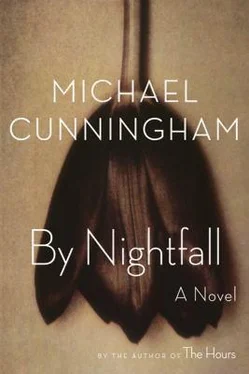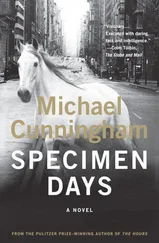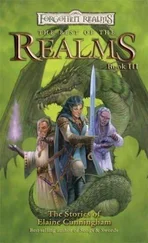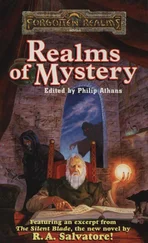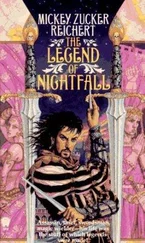“What are you making?” Delivered from above and behind, with the faintest hint of an Oxford accent.
It couldn’t be. No one was home.
Peter said, without looking up, “What’re you doing here?”
“Mrs. Fletcher is sick. What are you making?”
“It’s a surprise.”
He glanced back at Matthew. Matthew’s face was flushed with the cold, which gave it a cherubic incandescence. He wore a bright green scarf knotted around his neck.
“Is it a present for Mom?” he asked.
“I don’t know.” Peter returned his attention to the pieces of birdhouse.
Matthew leaned in close, behind him. “Look,” he said, “it’s a little house.”
It’s a little house. Four innocent words. But when Matthew pronounced them, with lilting precision, some vortex came whirling down around Peter, some funnel of soured air that sucked the breath out of him. He was trapped here, pinned to these cold stones and this sad little project; there was no chance for him, no hope, he who enjoyed being a manservant, who was without brilliance, who contentedly ran the most trivial errands. He had been caught by Matthew in the act of making a little house and he was humiliated forever, he was a foolish small thing and would always be.
He will prefer, later, to remember it as an act of pure rage, unthinking, barely conscious, but in fact he passed over into a state of white-hot clarity in which he understood that he could not be there at that moment, he couldn’t survive Matthew watching him and saying, “Look, it’s a little house,” but there was no way to escape and so he needed to take the screwdriver and gouge a hole in the air around Matthew, through which Matthew would disappear. Peter turned and leaped up with the screwdriver in his hand. He caught Matthew on the temple, an inch above his left eye. He would be grateful for the rest of his life that he had only scarred his brother, and not blinded him.
Although nothing as dramatic as the screwdriver attack ever occurred again, it did seem to subtly but permanently alter Peter’s domestic reputation. It established him as dangerous, possibly unstable, which was on one hand discomfiting and on the other an improvement. He had, at the very least, demonstrated to everyone that he was a bad pet. The game of Giles the manservant was abandoned without comment.
He and Matthew lived together for several years afterward as a supposedly tame fox might live with a peacock. Matthew was for the most part nervously gracious to Peter. Peter for the most part pressed his new advantage. It had not occurred to him until then that a single act of brute violence—with a screwdriver , something anyone could do—might inspire in his brother, in anyone, a lasting attitude of fearful and grudging respect. Peter became by slow degrees a seven-year-old general, friendly in a knowing, cheerfully threatening, almost courtly way, as if friendliness were a temporary concession he made to a brutal and duplicitous world.
Three years passed in the reign of Peter the Terrible.
Matthew at fifteen.
Tall fey figure walking with ardent steps past the brick and stone housefronts of Milwaukee, books held to his chest. Inexplicably optimistic, much of the time, though as he grew from childhood to adolescence he had the good sense to develop irony. Taunted by the local goons but not with the venom and devotion you might expect. Peter has always believed that Matthew possessed some aspect of the immaculate. Although there was nothing in any way saintly about him he did have an innocence of purpose that must have been evident in the more modest saints. Matthew was so entirely himself, so enraptured by his interests (by age fifteen: movies, the novels of Charles Dickens, skating, and the acoustic guitar), so harmless, so cordially indifferent to everyone but the two girls who were his only friends, that although he was teased occasionally and smacked around exactly once, by a gaggle of seventh-grade boys looking to establish a reputation, he was never the object of the prolonged campaigns of annihilation some of the boys waged against the handful of true unfortunates. Matthew was also, surely, kept at least relatively safe by his skater’s body, with its implication of coiled power (though he’d have had no idea how to punch anyone), and by his friendship with Joanna Hurst, a celebrated beauty. Whether it was calculated or spontaneous, he had been since the fifth grade the friend and confidant of a powerful, desired girl, and so somehow, in the admittedly rather rudimentary local estimation, was able to pass as an athlete (skating, but still) and a boyfriend (no scintilla of sex between them, but still). If Matthew was quite possibly the most effeminate person in Milwaukee, he was increasingly possessed of what Peter can only call a precocious grandeur. Peter’s aspect of nascent threat, unsupported by any further attacks, had by then solidified into what was generally regarded as cantankerousness, which his mother further diminished by calling him Mr. Grumpy whenever he was in a mood. His skin erupted, his hair went lank, and he found himself, to his surprise, a member of a small boy-band of malcontents, geekily devoted to rock music and Star Trek , neither admired nor derided, simply left alone. Matthew, on the other hand, was prominent. Glamorous, even. He was clever, rarely argumentative, never snippy or petulant, and even the most dour and threatening boys seemed to find him entertaining. He became a school mascot, of sorts. As he swanned his way through adolescence he treated the other members of the family, including Peter, with a sweet-tempered if occasionally weary, wised-up patience, like a noble child sent to live with common folk until he was ready to assume his true position. As he grew into himself it became possible, in his presence, to feel like a crusty but good-hearted dwarf, or a kindly old badger.
With an uneasy truce declared between them, once Peter had been stripped of his dangerousness, he and Matthew began having brotherly talks at night. Their conversations were wide-ranging but oddly consistent. Decades later, Peter can patch together a meta-conversation, made up of bits and pieces from hundreds of them.
“I think Mom’s just about had it,” Matthew says.
“With what?”
“Everything. Her life.”
This is semiplausible. Their mother can be brusque and short-tempered, she carries about her an almost constant air of incipient exasperation, but she’s always seemed, to Peter, to have “had it” not with her life but with endless particulars: her sons’ domestic lassitude, the dishonest and incompetent mailman, taxes, governments, all her friends, the price of just about everything.
“Why do you think that?”
Matthew sighs. He’s invented a long, low, sloughing sigh; something of woodwind about it.
“She’s stuck here,” he says.
“Yeah…”
I mean, we’re all stuck here, right?
“She’s still a beautiful woman. There’s nothing for her here. She’s like Madame Bovary.”
“Really?”
Peter at the time had no idea who Madame Bovary was, but imagined her to be an infamous figure who presaged doom—he had in all likelihood mixed her up with Madame Defarge.
“Do you think you could talk to her about her hair? She won’t listen to me.”
“ No . I can’t talk to Mom about her hair .”
“How’s it going with Emily?”
“How’s what going?”
“Come on.”
“I don’t like Emily .”
“Why not?” Matthew says. “She’s cute.”
“She’s not my type.”
“You’re too young to have a type. Emily likes you.”
“No, she doesn’t.”
“And it would be a bad thing if she did? You’ve got to stop underestimating your own charms.”
Читать дальше
Конец ознакомительного отрывка
Купить книгу
